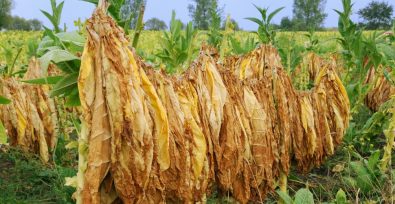Yesenia Cuello is a co-founder and the executive director of NC FIELD, a community-based organization that helps marginalized communities overcome barriers to resources. This article is syndicated by Beacon Media.
I was 14 the first time I worked in a tobacco field alongside my family.
We entered a field we couldn’t see the end of. We slit holes in black trash bags to wear over our clothes, keeping us dry from the dew. The spray from the tractors across the road made our noses itch and our eyes water. We ignored what we were told was “vitamins for the plants” being sprayed.
The tobacco stood taller than most of us, making it impossible to see between the rows as the sun caused the air to wave and the humidity to climb, heavy and suffocating.
When we finally stopped sweating, and the air felt cool against the back of our necks, even as our vision blurred, we assumed the worst had passed. We didn’t know then that our daily labor exposed us to the nicotine equivalent of a pack of cigarettes, chronic heat illness, and pesticide drift with lifelong health impacts.
We stayed together and took care of each other as we worked. The only thing we knew was that we needed the money.
Leading the nonprofit organization NC FIELD (North Carolina Focus on Increasing Education, Leadership & Dignity) was the first time I learned that what I experienced as a teenager was about food and labor justice. As part of NC FIELD’s leadership, I helped bring national attention to child labor, including advocating for the first federal minimum age for workers permitted to apply pesticides. We learned our words matter.
Advocating for the rights of those in our fields has become even more important over the years in North Carolina. Some who worked before us told us about breaks under shaded trees, cold lemonade, and the dignity of friendship with the farmer. Hard work was met with deep appreciation.
That’s not our story.
We were picked up by a van before sunrise. There were no scheduled breaks. We were yelled at to move faster or be fired. Water, if provided, was scarce or dirty; we were paid in envelopes of cash, and then we were transported back home. We didn’t know the farmer, and we knew not to ask their name.
We developed our own sense of belonging alongside those who embraced us. I remember a few local church ladies and teachers who showed kindness and took the time to understand us. They saw us, but to others, I was just labor — temporary, not part of their Southern heritage or the community.
Our invisibility isn’t accidental. It’s by design. The system bullies us into staying quiet, ignorant of the dangers of this work, and remain unseen in both life and death. Workers like us grew up with little access to healthcare through Medicaid, food assistance, or other safety nets. The assumption is that those resources are not for us or, by seeking that help, could endanger those we love.
During the pandemic, we were briefly called “essential.” Today, we’re labeled criminals, thieves of the American Dream. We pause before stepping outside our homes to attend church services or go to the grocery store.
And yet, the food supply still depends on the labor of thousands of migrant farmworkers in North Carolina. Eastern North Carolina drives our state’s place as one of the top 10 states in agricultural products sold, according to federal data.
I know what will happen if the immigrants who work North Carolina’s farms are taken away. If deportation forces continue to tear us from our communities, the impact will be catastrophic: crippling farms, driving up food prices, and destabilizing the food system that families across the nation depend on every single day. The consequences will ripple far beyond the fields, leaving damage that will be felt for generations.
We live with chronic stress, fear of robbery in migrant housing where it is illegal to lock doors, US Immigration and Customs Enforcement (ICE) raids on farms and backcountry roads, at our children’s schools, and in our hospitals. We go out, holding our documents in one hand and our child’s hand in the other, regardless of our legal status or citizenship.
That’s the reality of being a person of color and speaking Spanish in North Carolina today.
Who will keep farms thriving and stores supplied when thousands of us are gone? We remain essential regardless of the immigration system that facilitated our dehumanization. To deport farmworkers on a mass scale is to gamble with everyone’s food security.
This system may have been built on our silence, but our silence has not kept us safe. So, we are sharing our stories. We help make our state and the US thrive. We will continue to work, hope and pray for the dignity of human existence.







It is no coincidence that this forced labor requires people to participate in something that abuses conscience, preparing tobacco that according the W.H.O. kills 600,000 innocent nonsmokers a year makes equal to the Nazis usg slave labor to build and help run the concentration camps.